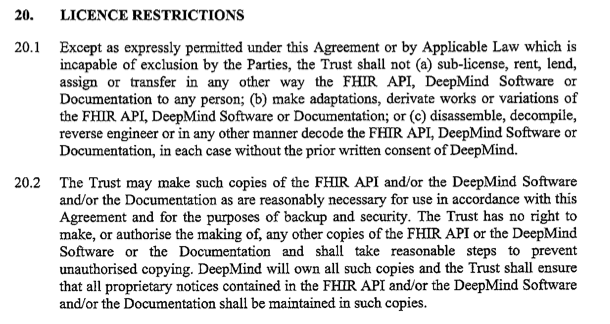For immediate release – Tuesday 28 February 2017
One year after first telling the public that “technology company DeepMind” [1] was going to help the NHS, it is still unclear whether Google’s duplicitous offer still includes forcing the NHS to hand over the medical history of every patient who has visited the hospital. [2]
It is no surprise that digital tools help patients, but is Google still forcing the NHS to pay with its patients’ most private data?
As the NHS reorganises itself again with the Secret Transformation Plans, [3] NHS England plans a ‘National Data Lake’ for all patient data. [4] Of which this is one. In defending giving data on all its patients to Google, Royal Free’s Chief Executive, David Sloman, said “it is quite normal to have data lying in storage”. [5]
Tomorrow the Government announces the UK’s new digital strategy, [6] including new money for the Artificial Intelligence in which DeepMind specialises. Is copying of data on a whim what the future holds?
Clause 31 of the Digital Economy Bill suggests precisely that [7] – data can be ‘shared’ (copied) to anyone associated with a public or NHS body [8] who can justify it as “quite normal to have data lying in storage”.
As Downing Street takes the Trump approach to health data, [9] does Google now say the ends justify the means?
Phil Booth, coordinator of medConfidential said:
“So toxic is the project, the latest press release doesn’t even use the word “Google”.
“It is good that 11 patients a day get faster care due to this tool; but Google will still not say why they wanted data on thousands of patients who visit the hospital daily.
“Until patients can see where their medical records have gone, companies will continue to predate upon the NHS to extract its most important resources.”
Notes to Editors
1) This is how Google’s wholly-owned subsidiary, DeepMind – based in the Google offices in London – was misleadingly described in this press release published by the Royal Free: https://www.royalfree.nhs.uk/news-media/news/new-app-helping-to-improve-patient-care/
2) ‘Google handed patients’ files without permission: Up to 1.6 million records – including names and medical history – passed on in NHS deal with web giant’, Daily Mail, 3/5/16: http://www.dailymail.co.uk/news/article-3571433/Google-s-artificial-intelligence-access-private-medical-records-1-6million-NHS-patients-five-years-agreed-data-sharing-deal.html
3) Hospital cuts planned in most of England: http://www.bbc.co.uk/news/health-39031546
4) medConfidential comments on NHS England’s National Data Lake: https://medconfidential.org/2017/fishing-in-the-national-data-lake/
5) The Government confirms that the bulk data copied by DeepMind, i.e. SUS, “are maintained for secondary uses” and not direct care: http://www.parliament.uk/business/publications/written-questions-answers-statements/written-question/Lords/2016-12-07/HL3943
6) Due to launch on Wednesday, being now pre-briefed by the Minister: https://twitter.com/MattHancockMP/status/835835027611127809
7) Clause 31 of the Digital Economy Bill as currently drafted would allow any provider of a service to a public body (such as Google to the NHS) to share data with (i.e. provide a copy to) any other provider.
8) While the Draft Regulations for Clause 31 state that Department of Health bodies are excluded from the Clause, medConfidential has received confirmation that such bodies will be included in the final regulations after Parliament has considered the Clause without health included.
9) The NHS is being forced to release the names and addresses of vulnerable patients to the Home Office: http://buzzfeed.com/jamesball/trumping-donald-trump
Questions that remain unanswered from May 2016 include:
- What was the basis for Google to get 5 years of secondary uses data on every patient who visits the hospital? Google is getting thousands of people’s data per day, yet the hospital admits it is helping only a small fraction of them.
- Why did the app not simply access the data it could clinically justify, when it needed to display it? That would have provided all the benefits of the app to patients and clinicians, and not given Google the medical records of patients which it had no justification for receiving. Did Google even talk to the hospital’s IT provider about access to only the data it needed before demanding all the data the hospital held?
medConfidential made a complaint to the ICO and National Data Guardian about the project in June 2016. Google and the Royal Free Hospital have failed to yet provide satisfactory answers and we understand the investigation remains ongoing.
-ends-



